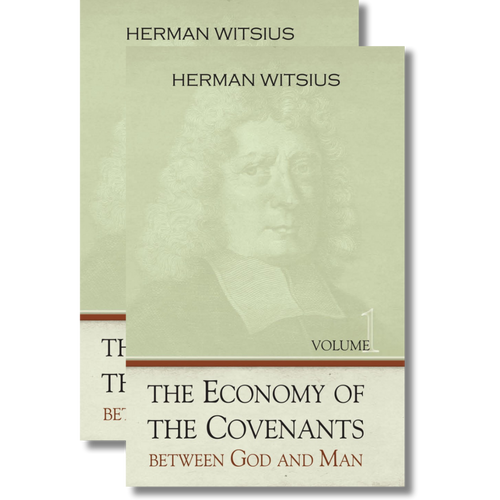Description
This, his magnum opus, is a reflection of some of the most fruitful and mature thinking on federal theology during the seventeenth century, and still holds a preeminent place in our own day. Reformed theology has always understood the biblical doctrine of the covenant to be the theological framework which best unifies Scripture, making it a consistent hermeneutic. In this two volume work, Witsius, presents the reader with a fully biblical and experiential doctrine of the divine covenants; opening up their nature, stipulations, curses, and blessings. Anyone interested in Reformed theology should read this book, for it is Reformed theology at its best.
Contents
Book I
- Of the Divine Covenants in General
- Of the Contracting Parties in the Covenant of Works
- Of the Law, or Condition, of the Covenant of Works
- Of the Promises of the Covenant of Works
- Of the Penal Sanction
- Of the Sacraments of the Covenant of Works
- Of the First Sabbath
- Of the Violation of the Covenant of Works on the Part of Man
- Of the Abrogation of the Covenant of Works on the Part of God
Book II
- Introduction to the Covenant of Grace
- Of the Covenant between God the Father and the Son
- The nature of the Covenant between the Father and the Son, more fully explained
- Of the Person of the Surety
- Of the Suretiship and Satisfaction of Christ
- What Sufferings of Christ are Satisfactory
- Of the Efficacy of Christ’s Satisfaction
- Of the Persons for whom Christ Engaged and Satisfied
- After what manner Christ Used the Sacraments
Book III
- Of the Covenant of God with the Elect
- Of the Oneness of the Covenant of Grace, as to its Substance
- Of the Different Economies or Dispensations of the Covenant of Grace
- Of Election
- Of Effectual Calling
- Of Regeneration
- Of Faith
- Of Justification
- Of Spiritual Peace
- Of Adoption
- Of the Spirit of Adoption
- Of Sanctification
- Of Conservation
- Of Glorification
Book IV
- Of the Doctrine of Salvation in the first age of the world
- Of the Doctrine of Grace under Noah
- Of the Doctrine of Grace from Abraham to Moses
- Of the Decalogue
- Of the Doctrine of the Prophets
- Of the Types
- Of the Sacraments of Grace down to Abraham
- Of Circumcision
- Of the Passover
- Of the extraordinary Sacraments in the Wilderness
- Of the Blessings of the Old Testament
- Of the Imperfections falsely ascribed to the Old Testament
- Of the real Defects of the Old Testament
- Of the Abrogation of the Old Testament
- Of the Benefits of the New Testament
- Of Baptism
- Of The Lord’s Supper
Endorsements
“Herman Witsius’s Economy of the Covenants is a pinnacle achievement in the history of Reformed doctrine, serving as a principal exhibit of the federal theology that marked Reformed thought in the seventeenth century. Witsius, always writing in an irenic style, sought to retain the best traits of Cocceian thinking, while following more directly in the path of Voetian orthodoxy. Witsius’s Economy presents readers with a full study of the covenant of works, followed by an even more comprehensive treatment of the covenant of grace (including the pactum salutis). Witsius handles all the relevant issues: the nature of conditionality in the covenant, the substance of the divine promise, the parties with whom God establishes His covenant, Christ’s Suretyship, the unity and diversity of the evangelical covenant, as well as a complete handling of the ordo salutis—the order of salvation—and the historia salutis—the history of salvation. In this, his greatest work, Witsius—a pastor-theologian, and a man of great piety—puts on display his immense theological talent. These volumes should not be missed!”
—J. Mark Beach, Professor of Ministerial and Doctrinal Studies at Mid-America Reformed Seminary, Dyer, Indiana
“It is works such as these that take us beyond milk to the meat of the Word. If you want to know what confessional Reformed theology and piety looks like and how we understood Scripture before Barth turned the tradition upside down, there are few authors whose work will repay your investment of time and money more completely than Herman Witsius. Who should buy and read these volumes? Any elder, any minister, and certainly every Reformed seminary student. If you love your pastor and if he doesn’t have these works, you should make sure that he has them. If you know a seminary student who is studying to enter the ministry or otherwise to teach the Reformed faith, be sure that he has these volumes.”
—R. Scott Clark, Professor of Church History and Historical Theology at Westminster Seminary California
About the Author
Herman Witsius (1636-1708) was Professor of Divinity in the Universities of Franeker, Utrecht, and Leyden. A brilliant and devout student, he was fluent in Latin, Greek, and Hebrew by the age of fifteen, when he entered the University of Utrecht. He was ordained at twenty-one and served in several pastorates, filling both the pulpit and the academic chair over the course of his life.







